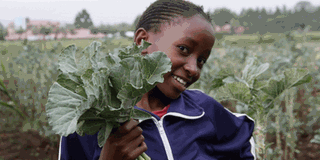Farming makes my school life cool

Joan Sorange a Std 6 pupil at Tumaini PCEA Mission School in Nakuru poses with kales harvested at the school farm. Suleiman Mbatiah (Nakuru) 140703
What you need to know:
- “We harvest an average of 10 bags of maize and two bags of beans per season. The school also gets two bags of kale weekly, which saves us Sh2,000,” he says, adding, they are now diversifying to carrots and cabbages.
- Most of the savings, Njoroge says, finances lunch for low-income family pupils who cannot afford the Sh20 needed daily for the school’s lunch programme.
- Back to Nairobi’s Aquinas, the school, whose eight cows—three lactating—supplement students’ milk needs, may not be as self-reliant in food production as the Rift Valley counterparts, but the popularity of agriculture as a subject is undeniable.
Just how much land does a school need to feed its own?
Not much, according to head of agriculture at Aquinas High School Caroline Otunga, whose squad treated the institution’s 1,200 students to a feast of ‘home-grown’ maize from a mere quarter-acre plot last year.
It was eureka moment for Otunga for whom it’s now a lot easier to convince students that farming could, indeed, be the mainstay of one of the oldest schools in Nairobi’s Eastlands.
But if the Aquinas green maize fiesta was a one-off, the plot is repeated many times over at Moi Primary School in Nakuru Town which saves up to Sh71,000 a year through farming, besides providing lunch for its more than 1,000 pupils.
It’s here where Marvin Macharia, with no kitchen garden at his parent’s home, enjoys learning agriculture and practising it on the school’s one-acre farm.
The 13-year-old Class Seven pupil is a member of the Security Club, but often joins 4K Club members at the school farm.
“I enjoy participating in growing crops and weeding,” he told Seeds of Gold. Macharia is just one among thousands of learners countrywide, who produce food for their schools, thereby conquering hunger and lifting the national economy in their own little way.
Moi Primary’s headteacher Charles Njoroge knows the importance of this too well.
“We harvest an average of 10 bags of maize and two bags of beans per season. The school also gets two bags of kale weekly, which saves us Sh2,000,” he says, adding, they are now diversifying to carrots and cabbages.
Finances lunch
Most of the savings, Njoroge says, finances lunch for low-income family pupils who cannot afford the Sh20 needed daily for the school’s lunch programme.
4K Club members lead farming at the school supported by enthusiastic non-members like Macharia. In the process, they learn agricultural skills that most urban children miss. “There is no greater way of building tomorrow’s farmers,” Njoroge notes.
Nearby Tumaini Mission School, with a 10-acre plot, does not buy any maize for its 430 learners as it harvests 200 bags of which it sells the surplus. The farm also produces enough kale—16 bags per month—besides carrots and tomatoes.
On-school farming spin-offs include health gains. “You can’t control how much chemicals are sprayed on crops that you buy or how maize is dried, but here we are in control,” Tumaini farm manager Sammy Kiige says.
Back to Nairobi’s Aquinas, the school, whose eight cows—three lactating—supplement students’ milk needs, may not be as self-reliant in food production as the Rift Valley counterparts, but the popularity of agriculture as a subject is undeniable.
How has Teacher Otunga managed to popularise the subject among dot.com urban youth to a point where students in 17 out of the school’s 20 classes take it?
“I tell them we can’t download food digitally, but with the agricultural knowledge, skills and attitudes acquired in high school, we are equipped to venture out and excel in a variety of careers.”
Infusing career talk in her lessons, Otunga likens nursery management in agriculture to nurturing a new-born.
“Caring for young seedlings is like a doctor taking care of a baby in an incubator. Having been in agriculture, a student is able to follow many other professions,” she says, a point a former student in her class confirms.
Dan Amukowa, who just completed a biotechnology course at the University of Nairobi says: “I’m trained to work in places handling micro-organisms, for example hospitals, food manufacturing firms and airports checking imported agricultural products and other bio-threats.”
Maize and beans
Moses Mulama is Otunga’s other star. The first totally blind boy to choose agriculture for 2013 Kenya Certificate of Secondary Education exam at Aquinas scored B- (minus) and hopes to join the Kenya Science Campus of the University of Nairobi to study Resource Management or Community Development.
“People should erase the mind-set that agriculture is all about jembes,” the 19-year-old, who lost his eyesight in a botched cataract operation quipped when Seeds of Gold asked him how he could possibly do the subject given his visual impairment.
Besides excelling in the agriculture theory paper, which was his forte, Mulama planted maize and beans to earn entry grades for visually challenged learners.





